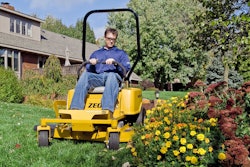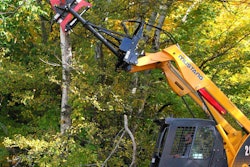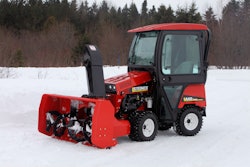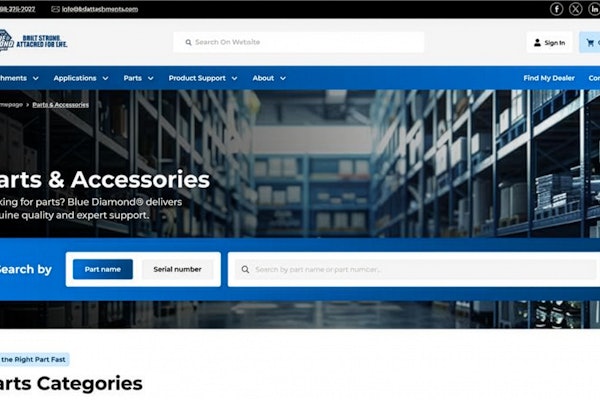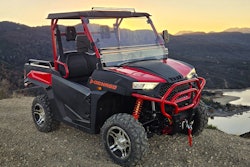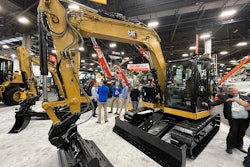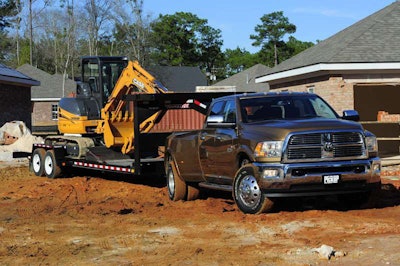 Trucks and trailers are a landscaper’s go-to couple, but the new trend is opting for customized truck beds.
Trucks and trailers are a landscaper’s go-to couple, but the new trend is opting for customized truck beds.Photo: Hard Working Trucks
The lawn-care business isn’t the same without its trucks. Just like a farmer needs his tractor, a landscaper needs his truck.
As your business grows, chances are your fleet will need to grow with it. Here are a few things to keep in mind when you’ve decided it’s time to invest in a new company vehicle:
Productivity
Whatever choice you end up making, always keep in mind that your goal is increasing productivity. Pickup trucks with trailers are a landscaper’s standby because they have been getting the job done for more than 40 years. But times are changing.
While trailer-hauling pickups aren’t going to disappear in your lifetime, it seems more and more landscaping companies have begun to invest in customized, medium-duty to heavy-duty trucks or cabovers.
Customized truck beds retain their value, unlike trucks themselves. The simple reason why companies are going trailer-less is because maneuvering around a jobsite is a lot easier without one; plus, finding an alternative to pulling a trailer cuts costs for fuel and tires.
“In areas where the streets are really tight … it’s just not practical to use a truck and trailer,” says Howard Mees, vice president of operations and equipment for Calabasas, California-based ValleyCrest Companies. “Cabovers are easier to turn.”
Safety is another factor, of course, and minimizing the use of trailers means you won’t need to train as many seasonal employees on how to drive – and especially how to back up — with a trailer in tow.
Know your weight
If you start off with the right gross vehicle weight (GVW), then you can extend the life of your truck. Engines, brakes, transmissions and tires all endure longer if not overloaded.
Take an inventory of your equipment’s weight, along with crew members, filled gas cans, and debris you may collect at the jobsite. Medium-duty trucks have a GVW of 10,000 to 26,000 pounds. Heavy-duty trucks weigh more than 26,000 pounds.
Size matters
If you have small crew and not a lot of equipment, don’t kid yourself and buy a commercial crew-cab truck hoping to grow into it. Save money with a fuel-efficient vehicle that meets your needs today.
For some landscaping companies, a commercial crew-cab truck may be the way to go, especially if it’s replacing two pickups. At ValleyCrest, they use a semi tractor-trailer rig that is able to move skip-loaders, a trencher and a skid-steer in one trailer.
“We’ve found that maximizing the economies of a single move rather than a triple move just makes more sense,” Mees says. “The operating costs are actually less.”
Branding
According to Super Lawn Trucks, 70 percent of all work trucks in North America are white. By simply choosing a custom paint color, your truck joins the other 30 percent who stand out from the crowd.
Most big brands are associated with a color — John Deere, for example, with its lawn green and bright yellow. Follow their example and be consistent in your color scheme for uniforms, website and brochures.
You’ve heard it a thousand times: Your vehicle is a form of advertising when it’s on the street where you’re working. Let people know who you are, whether with magnet signs, stickers or even vehicle wraps.
To diesel or not to diesel
What was once the cheaper fuel option, diesel, is now more expensive than gasoline and appears likely to remain higher for the time being. For some companies, the choice depends on whether fuel-efficiency or power is needed more.
“It depends on what we need the engine to do,” says Josh Kane, owner of Kane Landscapes in Potomac Falls, Virginia. “If it’s going to be pulling a trailer, we don’t want gas because (the engine) heats up too much.”
Diesel engines yield more torque at a lower RPM. Gasoline engines, on the other hand, offer quicker acceleration and are cheaper than diesel trucks.
Propane and biodiesel are other options, but most landscaping companies apparently see more cons than pros when it comes to investing in either as a main fuel source.
